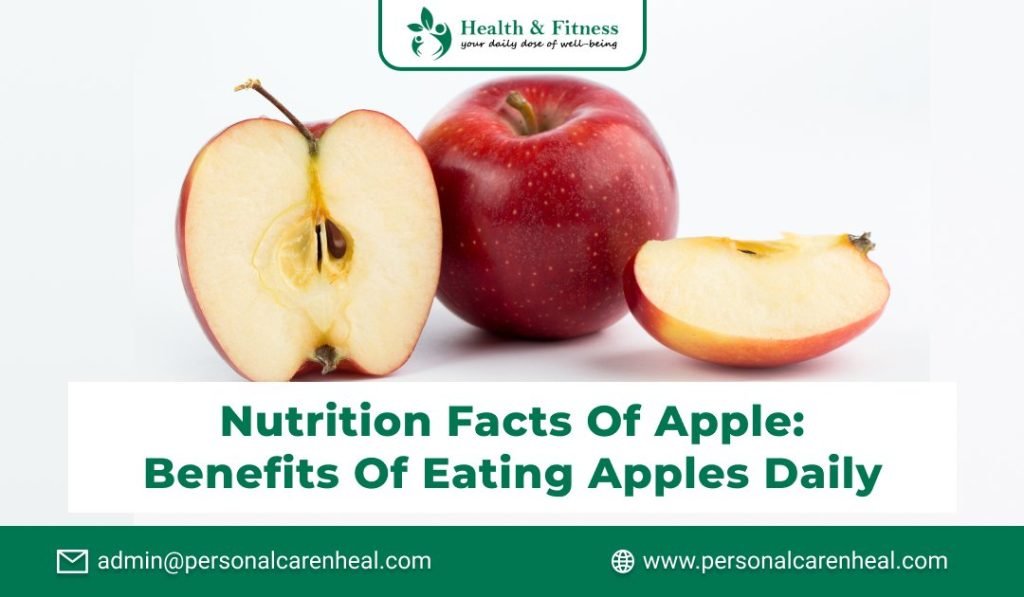Apples are one of the nutritionally-rich fruits available. Individuals can have various benefits from apples as they are rich in minerals, vitamins, antioxidants, and dietary fibres. Consumption of apples can minimize the risk of diseases of the brain, heart, bones, gastrointestinal system, and eyes. In today’s blog, we’ll discuss nutrition facts on apples, the benefits of eating apples, possible side effects of eating apples and much more.
Why Should You Eat Apples? What Apple Contains?
Apple is a nutrition-rich fruit that offers various health benefits. Apples may reduce the risk of diabetes, cancer, and heart disease. According to research, apples may help reduce weight, while boosting brain and gut health. Apples contain carbohydrates, vitamins, fibre, and phytochemicals.
Apple Nutrition Facts
The nutrition facts may vary depending on the variety of apples, but not all that much. Here are the nutrition facts of apples with a serving size of 182 g or 1 medium.
Calories: 95
Carbohydrates (g): 25.13
Sugars (g): 18.91
Fibre (g): 4.4
Calcium: 11 mg
Potassium: 195 mg
Magnesium: 9 mg
Vitamin C: 8.4 mg
Why Apple is Good for Health?
There are various reasons for eating apples, such as:
Good for heart
Eating apples is linked to a reduced likelihood of developing heart disease, possibly due to their soluble fibre content. This type of fibre can help lower blood cholesterol levels. Additionally, apples contain polyphenols, including the flavonoid epicatechin, which may contribute to reducing blood pressure. Studies have also shown that consuming a high amount of flavonoids is associated with a decreased risk of stroke.
Prevent cancer
Quercetin, a potent natural antioxidant found in apples, disrupts different cell cycle phases and causes apoptosis (programmed cell death) in a variety of tumour types. A diet high in these kinds of powerful antioxidants may aid in the prevention of cancer.
Support Weight Loss
Apples are a filling and healthy food that can help you control your hunger. Numerous studies have demonstrated that eating apples helps people lose weight more effectively. Apples are abundant in fibre and water, which help you feel fuller for longer and help you avoid overeating. Eating an apple as a snack can increase your vitamin consumption.
Strengthen your lungs
According to research, frequent intake of apples may boost lung function. For instance, eating five or more apples a week is linked to improved lung health and a lower risk of COPD. Additionally, this could be attributed to apples’ strong antioxidant content, which includes flavonoids and vitamin C.
Reduce symptoms of asthma
People with asthma problems should eat apples as they contain flavonoids that are beneficial for asthma patients. According to studies, flavonoids reduce food allergy symptoms. Adding apples to your daily diet plan can reduce asthma symptoms as well.
Regulates blood sugar
Fibre reduces blood sugar increases after meals because it slows down digestion. The most fibre is found in whole apples with the skin on (apple juice is fibre-free). For every 1,000 calories taken, 14 grams of fibre are generally advised.
What are the Side Effects of Apple Fruit?
If you are fructose intolerant, then apples can result in bloating. You may also have discomfort, nausea, and diarrhea.
If you are allergic to pears, plums, and apricots, then don’t eat apples.
Drug interactions with apples have also not been studied well.
Frequently Asked Questions
How many apples per day?
On average, a person can eat 1-2 apples per day. If you eat more than two apples per day, then you may experience some side effects.
Can I eat an apple daily?
According to various studies, eating apples daily can benefit every part of your body. However, don’t consume apples in excess.
Is apple good for your skin?
Apples are high in flavonoids, antioxidants, and phenolic compounds that are helpful in protecting the skin from the effects of free radicals in the environment.
Can I eat an apple before bed?
You can have various health benefits from eating an apple at night. It can improve your sleep.
When to eat an apple?
The best time to have an apple is in the morning because the presence of pectin is beneficial for the intestine.
Should you eat an apple on an empty stomach?
According to reports, you shouldn’t eat apples on an empty stomach as it can cause constipation and bloating. After having breakfast, you can eat an apple.
Conclusion
The blog shares the nutrition content of apples, the benefits of eating apples along with possible side effects of eating apples in excess. Moreover, get such informative blogs on health by subscribing to Personal Care N Heal.
Our Popular Blogs:



